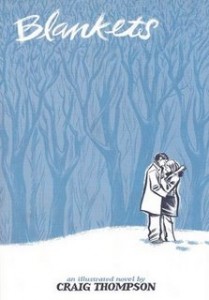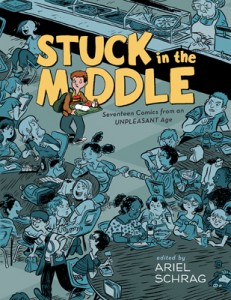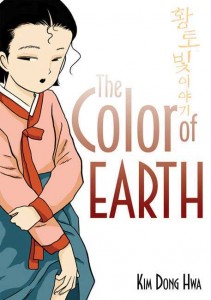Nothing gets a parent quite so anxious as their child’s teen years. Burgeoning adulthood comes with sexual awakening and an introduction to smoking, drinking, and any number of other vices. For many parents it can seem easier to limit a teen’s exposure to any hint of these problem areas, and from this attempt at protective insulation has sprung a veritable swarm of book challenges and bannings.
Blankets
 Blankets is the semiautobiographical story of author Craig Thompson’s upbringing in a religious family, his first love, and how he came to terms with his religious beliefs. Its depiction of Craig’s memories of life with his brother and his later relationship with fellow Christian camper Raina includes several scenes of nudity and some sexual activity.
Blankets is the semiautobiographical story of author Craig Thompson’s upbringing in a religious family, his first love, and how he came to terms with his religious beliefs. Its depiction of Craig’s memories of life with his brother and his later relationship with fellow Christian camper Raina includes several scenes of nudity and some sexual activity.
In October, 2006, the board of the Marshall Public Library, of Marshall, Missouri, held a hearing to consider a challenge from Louise Mills, who requested Blankets be pulled for its “obscene” drawings. In a letter to the trustees, co-signed with the National Coalition Against Censorship, the CBLDF discouraged the censorship of Thompson’s work, citing the legal definition of obscenity, the presence of sexual themes and nudity in acknowledged classic literature and art, and the critical acclaim and relevance of the story itself, as well as the dangerous precedent set by any decision to censor content. The public attention generated by the letter helped back the library board’s decision to retain the work unrestricted.
Stuck In The Middle
 More recently, anthology book Stuck In The Middle was challenged in Dixfield, Maine, for its language, sexual content, and drug references. Edited by Ariel Schrag, Stuck In The Middle contains seventeen short stories by the cream of the independent graphic novelist crop: Daniel Clowes, Dash Shaw, Gabrielle Bell, Lauren Weinstein, and more. As indicated by its subtitle, Seventeen Comics From An Unpleasant Age, the anthology runs the gamut of experiences and emotions of the middle school and junior high student.
More recently, anthology book Stuck In The Middle was challenged in Dixfield, Maine, for its language, sexual content, and drug references. Edited by Ariel Schrag, Stuck In The Middle contains seventeen short stories by the cream of the independent graphic novelist crop: Daniel Clowes, Dash Shaw, Gabrielle Bell, Lauren Weinstein, and more. As indicated by its subtitle, Seventeen Comics From An Unpleasant Age, the anthology runs the gamut of experiences and emotions of the middle school and junior high student.
The CBLDF’s response cited Schrag’s own argument against censorship, from a previous challenge:
In terms of foul language, sexual content, and teen smoking in this book, all the authors strove to present the teens and pre-teens in a realistic light. We may not like all of the decisions teenagers make, but if we sanitize their speech and behavior in our stories, our characters won’t be authentic. Real teens and pre-teens sometimes use these words and say and do these things. A book like this can present a good opportunity for dialogue between children and parents. Banning the book isn’t going to change children’s behavior or somehow save them from the hard truths of teenage life – I find it very hard to believe that a child would hear a swear word for the very first time in the book, or that he or she would be made aware that teenagers sometimes have sexual relationships or smoke cigarettes. The only thing that can make an impact in the way children act is communication, and this book provides a platform for that.
Unfortunately, though the school retained Stuck In The Middle, it was relegated to a restricted collection, requiring adult authorization for checkout.
The Color Of Earth
 The mother of all these challenges, however, is the opening volume of Korean series The Color of Earth. Listed by the ALA as the second-most-challenged book of 2011, Kim Dong Hwa’s critically acclaimed work follows the adolescence of a Korean tavern-owner’s daughter, awakening to romance and young adult life. Its was challenged for nudity, sexual content, and suitability for age group, and outpaced the attempts to censor the explicitly violent content of the #3 challenged book, Suzanne Collins’s Hunger Games.
The mother of all these challenges, however, is the opening volume of Korean series The Color of Earth. Listed by the ALA as the second-most-challenged book of 2011, Kim Dong Hwa’s critically acclaimed work follows the adolescence of a Korean tavern-owner’s daughter, awakening to romance and young adult life. Its was challenged for nudity, sexual content, and suitability for age group, and outpaced the attempts to censor the explicitly violent content of the #3 challenged book, Suzanne Collins’s Hunger Games.
All of these books — and plenty more — touch on material that makes parents uncomfortable, largely because of their accuracy in rendering the darker and more adult aspects of the adolescent experience, hence making them a frequent target of knee-jerk censorship. However, it is that same accuracy that renders these works relevant as an essential tool for communication with children, about the fundamental facts of their lives and as important to protect as any other literature or art.
Given their visual nature, graphic novels and comic books are among the most-challenged books in libraries and schools. CBLDF is an official sponsor of Banned Books Week, which takes place September 30 – October 6, 2012. Please help support CBLDF’s defense of your right to read by making a donation or becoming a memberof the CBLDF!
Joe Izenman is a freelance writer and musician in Tacoma, Washington. He owns a lot of comics and he’s pretty sure someone, somewhere would be offended by more than a few of them.